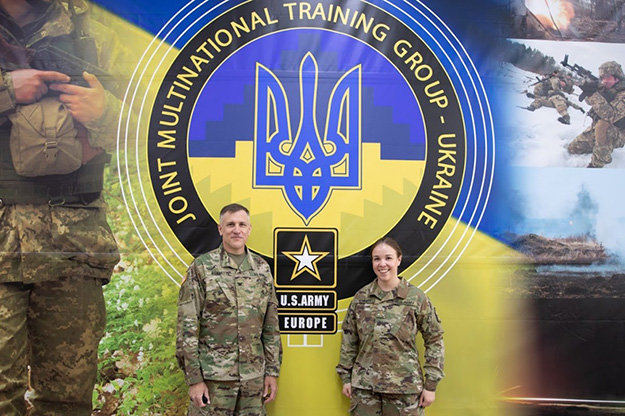U.S. Army Colonel Paul Schmitt, a Foreign Area Officer (FAO) stationed in Kyiv, Ukraine, was planning to retire after 30 years of service. Schmitt serves as the Army Attaché with the Defense Attaché Office (DAO) at the U.S. Embassy in Ukraine. The DAO represents the Department of Defense to the host-nation government and military and assists and advises the U.S. ambassador on military matters.
With Schmitt's impending retirement and no one qualified to replace him, the Army faced a critical capability shortage. A new authority granted by the National Defense Authorization Act (NDAA) of 2019 allows the Army to authorize select officers to serve up to 40 years. Under previous authorities, officers could only be retained for no more than five years based on their time in grade and service. When offered to extend his MRD, Schmitt agreed to postpone his retirement plans and continue to serve.
Schmitt is one of ten officers selected for a 2020 pilot, which includes Army War College professors and FAOs. The MRD Extension differs from previous Selective Continuation (SELCON) and retiree recall authorities because it focuses solely on an individual's unique talents and leverages their knowledge, skills, behaviors, and preferences to retain proven officers where and when they are needed.
The new MRD Extension policy applies to officers in the grades of O-3 to O-10. It allows the Army to select individuals with the knowledge, skills, and behaviors to deliver strategic impacts. Similar to the SELCON process, officers cannot apply for this program but must be selected and agree to the extension before their file is submitted to the board. The board must consider the balance between extensions and the overall force strength. While the initiative most directly impacts the Foreign Area Officer, Medical Corps, and Army War College proponents, Engineer and Infantry branches are also included.
Without Schmitt, the Army Attaché position in the Ukrainian embassy would remain vacant for more than one year. The FAO proponent identified Schmitt as having the requisite background and experience to fill this critical capability gap. Given the opportunity to continue service, Schmitt quickly agreed noting the cost savings to the Army and the continued benefit of the relationships he had already built.
"The Army could either pay my pension and get no backfill, or extend me for a few more years to receive a motivated and willing volunteer," said Schmitt.
Schmitt's knowledge, skills, and behaviors make him uniquely qualified to continue service in the Army in this capacity. He is a FAO with a Special Forces background and nearly 18 years of regional experience. He has undergraduate and graduate degrees in Russian, and he previously served as a foreign language instructor at the United States Military Academy (USMA) at West Point. His record of service includes multiple assignments in the United States European Command (EUCOM) theater as both a Special Forces officer and a FAO.
In recent years, Schmitt has been instrumental in equipping and training foreign military forces in former Soviet republics. His extension provides the Army with a uniquely-talented and experienced officer in a strategically consequential region of the world. His extension is an example of how new authorities and flexibility in talent management can retain the right officers in the right positions.
The MRD Extension is one of the many tools the Army is implementing to keep a competitive and intellectual advantage over adversaries. Since the initial pilot, the Army conducted five additional MRD Extension boards to identify officers with unique skills to retain in the service.
For Schmitt, the MRD Extension policy is a positive step towards talent management across all ranks.
"This is a win-win for the Army. Officers can continue to serve, and the Army can retain key capabilities," said Schmitt.
For more information about Army Talent Management visit https://talent.army.mil.





Read Comments